A new program from the Florida Fish and Wildlife Conservation Commission is incentivizing private landowners to help in the fight to preserve critical Florida panther habitat.
The FWC announced in mid-September that it has completed its first enrollment period for the Florida Panther Payment for Ecosystem Services pilot program, which offers private landowners in qualifying areas per-acre payments for providing habitat conditions that support panther conservation and landscape connectivity.
Funding for the three-year pilot program comes from the National Fish and Wildlife Foundation through the America’s Ecosystem Restoration Initiative grant, U.S. Fish and Wildlife Service, Fish & Wildlife Foundation of Florida and FWC.
FWC will pay a total of $519,012 to enrolled landowners in the first year of the initiative.
By the close of the application period last fall, FWC said it had received 69 applications representing over 172,000 acres across 14 counties. From those applications, 15 properties — including two in Collier County — totaling about 40,635 acres of what FWC calls valuable panther habitat were selected for enrollment in the program based on available funding and a competitive ranking process.
In addition to the two Collier County properties selected for the program, two are from DeSoto County, two are from Highlands County, two are from Polk County, six are from Hendry County and one is from Manatee County.
Kelsey Bernard, FWC’s ecosystem service program coordinator, said proximity to the Florida Wildlife Corridor was part of the criteria for program selection.
The Florida Wildlife Corridor is comprised of almost 18 million acres in a statewide network connecting lands and waterways that support a wide variety of wildlife species.
“All of our enrolled lands do fall completely within or partially within the priority lands for the Florida Wildlife Corridor, so these landowners are not just helping to protect panther habitat, but also statewide connectivity, which is important for wildlife as a whole,” Bernard said.

A Florida panther is captured on a trail camera in dense palmetto underbrush. Landowners enrolled in the PES program can also host cameras to track panther activity.
Support helps landowners keep property
She said programs such as PES provide support to the landowners to continue long-term land stewardship goals “that they have likely been participating in for many, many generations.”
The average payment to enrolled landowners will be about $34,600 for each year of the program, according to Bernard. Payment rates range from $7 to $17 per enrolled acre, with a minimum of 500 acres required and no maximum limit.
“It [PES] will allow them to continue that work, which is supporting wildlife and panthers,” she said. “And panthers are a large-ranging species, so the more private lands that we can support in this, the better.”
Bernard said the goal of the program is to “recognize and reward” the selected landowners through financial incentives for providing quality habitat and data on panther use of their land during the time that they are enrolled.
“This program can really act as a bridge to future conservation decisions, but also it’s providing that financial offset for some existing [land] management costs that allow landowners that flexibility and time for maybe considering longer-term programs, like easement, or just implementing current management decisions now that can support wildlife.”
The PES program also provides outreach on livestock depredation mitigation and best management practices for supporting panthers or working and rural lands, according to information on the agency’s website.
Bryce Foos, who owns a cattle ranch in far eastern Collier County that abuts the Florida Wildlife Corridor, said he had been hearing about the program and saw the value in helping conserve panther habitat — even though the predators could pose a threat to his animals.
“We own a little ranch out there and they [panthers] are already there,” Foos said in a phone interview. “They [FWC] were offering a program that would pay you to keep a panther habitat, and we thought we might as well take advantage of it.”
He said he tries to keep his cattle together and move them around to avoid predation, although infant or young calves are still vulnerable because they are the easiest for predators to get.
“That’s what I do, but I mean, it’s just like anywhere there’s animals: They’ve got to eat, too,” he said.
Foos, who said he grew up in South Dakota and Wyoming, was familiar with similar wildlife programs and sees the benefits of incentive programs such as PES that help preserve panther habitat.
“There’s a value in keeping a diverse [wildlife] population because they were basically native here,” Foos said. “It’s all on the management of them.”
Bernard said enrolled landowners can also qualify for bonus payments by voluntarily submitting photos or videos of panthers on their properties as part of the Cameras for Panther Conservation project that is part of the PES program. Participation is optional, and FWC said about 40% of the enrolled landowners have agreed to host FWC cameras to monitor for panthers.
And while the current program runs through 2027, Bernard said FWC is hopeful that funding would become permanent after the pilot period, perhaps from different or additional sources.
“We are exploring what long-term durable funding can look like for a program such as this so that we can create those additional opportunities for landowners to participate,” she said.

Wildlife biologists examine a panther kitten as part of ongoing monitoring efforts. The PES program supports both habitat protection and data collection.
‘Just one piece of the puzzle’
Asked for a response to the announcement of the new PES program, Amber Crooks of the Conservancy of Southwest Florida said the organization “generally speaking is supportive of these types of incentive programs.”
Crooks, who serves as the Conservancy’s senior environmental policy advisor, said programs such as this one are “just one piece of the puzzle” when it comes to protecting panther habitat from future development.
“We will be curious to see how this rolls on with these participants over the next couple of years: What is the result of this program?” Crooks said. “Was it successful in keeping these lands from being converted?
“But the PES program is just one part of the puzzle, and isn’t a replacement for some of the other initiatives that we know are ongoing or that are needed to protect panther habitat, such as money for public land acquisition and conservation easements that are permanent, and for panther crossings. It’s also no replacement, either, for agencies to say ‘no’ when ranch lands are proposed for conversion to development.”
Panther/vehicle collisions trending down
Even with four panthers — including two kittens — being killed by vehicles on Southwest Florida roads in August, Florida Fish and Wildlife Conservation Commission data shows a trend toward fewer panther mortalities from cars this year.
The two 3.5-month-old panther kittens were found on Aug. 10 on Davis Blvd. in Collier County after being struck by vehicles. A two-year-old female panther was struck and killed in Hendry County on Aug. 28, and an 11-year-old female was killed by a vehicle Aug. 29 in Collier County.
Of the 14 panther deaths recorded by FWC so far this year, 13 were due to vehicle collisions, while one was attributed to intraspecies aggression. Seven of the vehicle deaths occurred in Collier County — which has the largest recorded number of panthers and is also the largest county by land area in the state — with five occurring in Hendry County, one in Pasco County and one in Lee County.
In 2024, 36 panther deaths were reported, with 29 attributed to vehicle collisions.
Details on panther mortalities, including estimated ages, can be found on Panther Pulse at myfwc.com. Panther ages are determined through teeth examination by FWC biologists, according to the agency. Every documented panther receives an ID number, but not every panther is collared. Prefixes in front of the listed ID number include K for kitten, FP for collared panther and UCFP for uncollared panther.

Two Florida panther kittens peek from their den in Southwest Florida. A new FWC program pays private landowners to help preserve panther habitat.
In a statement after the two panther kittens were killed in Collier County, FWC spokesperson Lisa Thompson, with the Division of Habitat and Species Conservation, said vehicle collisions remain a concern, as they are the primary cause of death for Florida panthers.
“Historically, as the panther population increased, the numbers of panthers killed by collision with vehicles has also increased,” Thompson said. “We can’t speculate whether or not 2025 will see more mortalities due to vehicle collisions or less than previous years.
“Currently, we are seeing a trend towards fewer mortalities due to vehicle collisions this year than last, but that can change.”
Asked about efforts to reduce numbers of vehicle-related panther fatalities, Thompson said FWC staff works with the Florida Department of Transportation and the USFWS to reduce panther vehicle strikes on roads, “including the construction of wildlife crossings, nighttime slower speed zones for when panthers are more active and improvements to existing bridges and fencing.”
Conservationists, however, see the loss of panther habitat to increased development as one of the biggest contributors to vehicle collision fatalities. In a statement following the deaths of the panther kittens in early August, Sierra Club organizing representative Michael McGrath said vehicle strikes are “a result of Southwest Florida’s unchecked growth machine and lack of proper planning.”
“We’re heartbroken — losing two 3.5-month-old kittens of Florida’s most endangered and iconic species is a gut punch for a species that has almost no margin for error in its continued recovery — but not surprised,” McGrath said.
“If Floridians want a future shared with panthers, we must stop the sprawl that fragments core habitat. We must keep our shared landscape of both private and public lands connected.”
~ Therese McDevitt

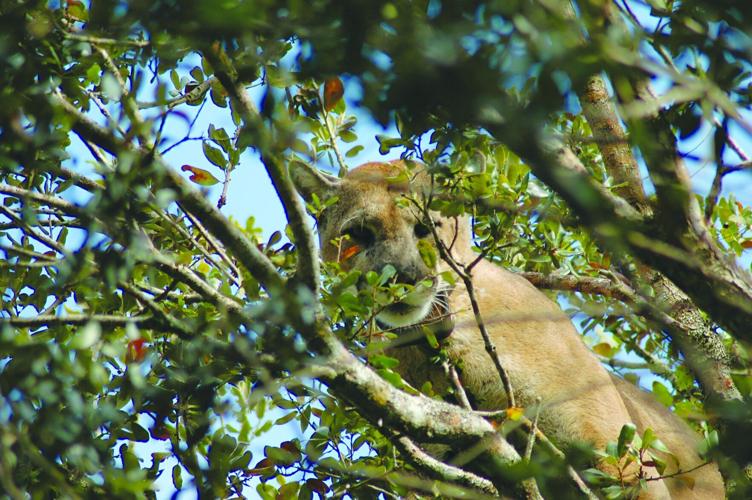
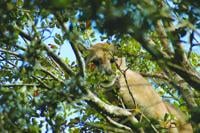

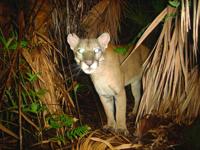



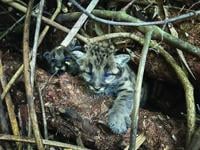
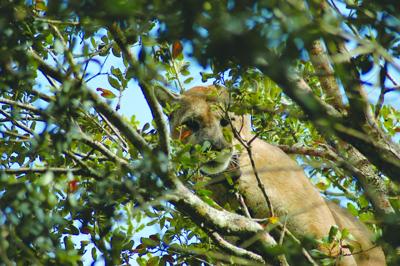
(0) comments
Welcome to the discussion.
Log In
Keep it Clean. Please avoid obscene, vulgar, lewd, racist or sexually-oriented language.
PLEASE TURN OFF YOUR CAPS LOCK.
Don't Threaten. Threats of harming another person will not be tolerated.
Be Truthful. Don't knowingly lie about anyone or anything.
Be Nice. No racism, sexism or any sort of -ism that is degrading to another person.
Be Proactive. Use the 'Report' link on each comment to let us know of abusive posts.
Share with Us. We'd love to hear eyewitness accounts, the history behind an article.